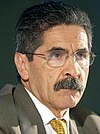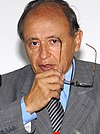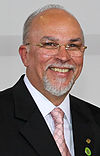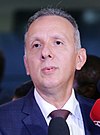Ministry of Cities
| Portuguese: Ministério das Cidades | |
 | |
| Agency overview | |
|---|---|
| Formed | 1 January 2003 |
| Type | Ministry |
| Jurisdiction | Federal government of Brazil |
| Headquarters | Esplanada dos Ministérios, Bloco A Brasília, Federal District |
| Annual budget | $20.39 b BRL (2023)[1] |
| Agency executives |
|
| Website | www |
The Ministry of Cities (Portuguese: Ministério das Cidades) is a cabinet-level federal ministry in Brazil, created on January 1, 2003.[2]
History
[edit]The ministry was created on January 1, 2003, at the start of the first presidency of Luiz Inácio Lula da Silva (Lula). According to The Guardian, "the ministry was set up to tackle the urban chaos of Brazil’s traffic-clogged megacities."[2]
The post was maintained under the subsequent presidencies of Dilma Rousseff and Michel Temer. When Jair Bolsonaro became president on 1 January 2019, he merged the position with the Ministry of National Integration to form the Ministry of Regional Development, under minister Gustavo Canuto.
When Lula became president for the second time, he re-established the ministry on January 1, 2023. Jader Barbalho Filho was appointed Minister of Cities, who pledged to rebuild the Minha Casa, Minha Vida public housing program.[3]
List of ministers
[edit]| No. | Portrait | Minister | Took office | Left office | Time in office | Party | President | |
|---|---|---|---|---|---|---|---|---|
| 1 | Olívio Dutra (born 1941) | 1 January 2003 | 20 July 2005 | 2 years, 200 days | PT | Luiz Inácio Lula da Silva (PT) | ||
| 2 | Márcio Fortes de Almeida (born 1941) | 20 July 2005 | 1 January 2011 | 5 years, 165 days | Independent | Luiz Inácio Lula da Silva (PT) | ||
| 3 | Mário Negromonte (born 1950) | 1 January 2011 | 2 February 2012 | 1 year, 32 days | PP | Dilma Rousseff (PT) | ||
| 4 | Aguinaldo Ribeiro (born 1969) | 7 February 2012 | 17 March 2014 | 2 years, 38 days | PP | Dilma Rousseff (PT) | ||
| 5 | Gilberto Occhi (born 1958) | 17 March 2014 | 1 January 2015 | 290 days | PP | Dilma Rousseff (PT) | ||
| 6 | Gilberto Kassab (born 1960) | 1 January 2015 | 15 April 2016 | 1 year, 105 days | PSD | Dilma Rousseff (PT) | ||
| 7 | Inês da Silva Magalhães (born 1963) | 15 April 2016 | 12 May 2016 | 27 days | Independent | Dilma Rousseff (PT) | ||
| 8 | Bruno Araújo (born 1972) | 12 May 2016 | 13 November 2017 | 1 year, 185 days | PSDB | Michel Temer (MDB) | ||
| 9 | Alexandre Baldy (born 1980) | 22 November 2017 | 1 January 2019 | 1 year, 40 days | PP | Michel Temer (MDB) | ||
| - | Merged into the Ministry of Regional Development | 1 January 2019 | 1 January 2023 | 4 years, 0 days | none | Jair Bolsonaro (Liberal Party (Brazil)) | ||
| 10 | Jader Barbalho Filho (born 1976) | 1 January 2023 | Incumbent | 1 year, 249 days | MDB | Luiz Inácio Lula da Silva (PT) | ||
References
[edit]- ^ "Portaria do MPO adapta orçamento para 2023". Ministério do Planejamento e Orçamento (in Brazilian Portuguese). 16 February 2023. Retrieved 31 May 2023.
- ^ a b Scruggs, Gregory (2019-07-18). "Ministry of cities RIP: the sad story of Brazil's great urban experiment". The Guardian. Retrieved 2019-07-20.
- ^ "Governo Lula: acompanhe o segundo dia de posse dos ministros". O Globo (in Brazilian Portuguese). Retrieved 2023-01-13.
External links
[edit]- Official website (in Portuguese)











